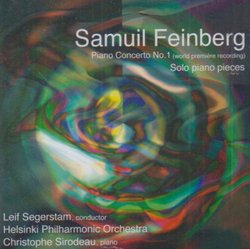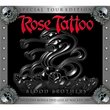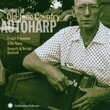| All Artists: Samuil Feinberg, Leif Segerstam, Helsinki Philharmonic Orchestra, Christophe Sirodeau Title: Piano Concerto No. 1 and solo piano works Members Wishing: 0 Total Copies: 0 Label: Altarus Original Release Date: 1/1/2008 Re-Release Date: 5/6/2008 Genre: Classical Styles: Forms & Genres, Concertos, Symphonies Number of Discs: 1 SwapaCD Credits: 1 UPC: 076958703423 |
Search - Samuil Feinberg, Leif Segerstam, Helsinki Philharmonic Orchestra :: Piano Concerto No. 1 and solo piano works
 | Samuil Feinberg, Leif Segerstam, Helsinki Philharmonic Orchestra Piano Concerto No. 1 and solo piano works Genre: Classical |
Larger Image |
CD DetailsSimilar CDs |
CD ReviewsFeinberg's Tormented First Piano Concerto and other Substant Hexameron | 08/27/2008 (5 out of 5 stars) "In his fascinating study, (Music of the Repressed Russian Avant-Garde, 1900-1929), Larry Sitsky refers to Samuil Feinberg (1890-1962) as "The Post-Scriabin Pianist." Feinberg's musical language and use of form is certainly indebted to Scriabin, but according to Sitsky, Feinberg's "art is darker than Scriabin's, and there is not that striving toward light." Intensity, anguish and rage are palpable trademarks of Feinberg's expressive style. Feinberg's tonal palette is comfortably akin to late Scriabin and Roslavets. The virtuosic demands and power of his piano-writing easily pummels Rachmaninov's and surpasses much of Scriabin's. Personally, I think Feinberg is one of the greatest Russian pianist-composers and his revival is important.
Although Feinberg recorded his own Second Piano Concerto and Victor Bunin, Feinberg's most outstanding pupil, recorded the Third Piano Concerto (Samuel Feinberg: Piano Concerto No. 3), the First had been presumed lost. It was performed rarely during Feinberg's lifetime and the orchestral score rotted away in the attic of the Moscow Conservatory until pianist Christophe Sirodeau and his aides discovered it. Premiered in 1932, Feinberg's First Piano Concerto was not warmly received and it is no wonder why. This is not happy music nor is it particularly pleasing to listen to, compared to the buoyancy of Prokofiev or lyricism of Rachmaninov. Feinberg's 33-minute concerto is extremely dreary, and purely expressive of angst and conflict. Much of the orchestration is original, but some of it is harsh, namely the dissonant brass fortissimi. The concerto itself is conceived as a single movement and unfurls like a balanced work for piano and orchestra. Feinberg keeps a harness on the soloist, but the piano-writing, specifically in the cadenzas, is technically awesome and forceful. Those familiar with the sonatas should appreciate Feinberg's integration of material from the Third Sonata into the work. Ultimately, I think this concerto is convincing as a highly-expressive musical statement; not a melodically riveting piece of music. Even the audience's applause at the end of this live performance seemed sedate and tepid. But I think pensiveness rather than enthusiastic shouts of "bravo" are adequate responses to this chaotic and disturbed work. Despite the major presence of the First Piano Concerto, many of the piano pieces on this recording are worth being recorded separately. In the case of the preludes, they have been. Jenny Lin recorded the murky and violent Four Op. 8 preludes (Preludes to a Revolution), which owe much to Scriabin and Anatoly Alexandrov. The Three Preludes Op. 15, miniature virtuosic powerhouses, have also been recorded with superb musicianship by Peter Paul Kainrath (Peter Paul Kainrath, Piano). I personally think Kainrath does greater things with the Op. 15 than Sirodeau, but both interpretations reveal new angles to Feinberg's ideas. Feinberg's "Fantasia No. 2 in E minor" is surely the most impressive solo piano piece on this disc and is being recorded for the first time. With tempo markings like "lugubre" and "lacrimosa," the piece conveys grief and agony that is at times overwhelming but always beautiful. The cataclysmic outbursts of the central section and the torrential climax are unforgettable. Bottom line: For those new to Feinberg's music, I would encourage exploring the sonatas first (Samuil Feinberg: Piano Sonatas Nos. 1-6 | Samuil Feinberg: Piano Sonatas Nos. 7-12). There is no denying that Feinberg's First Piano Concerto is for the connoisseur, but his solo piano music is more accessible and should appeal to anyone with an affinity for late Scriabin, Roslavets, or even Busoni." |


